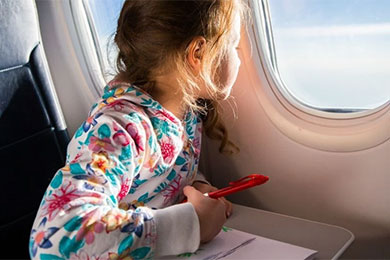Future of business travel

The spread of the COVID-19 pandemic across the globe at the start of 2020 brought business travel to a halt. As countries shut their borders and implemented lockdowns, travel plans were cancelled and many workers advised to remain in their homes. According to the Global Business Travel Association (GBTA), 98% of their member companies cancelled or suspended all or most international business travel. “The situation was evolving every single day,” says Xavier Florit, Regional Head of Corporate, Accident & Health, Continental Europe. “Even if you took a decision one week, this decision was no longer relevant the week after.”
Flexibility and resilience
Companies that have restarted business travel have to adapt to the new normal. Flexibility and resilience are words on everyone’s lips in the current pandemic landscape – and proactivity. “In our role as insurer we tried to use that word as soon as possible: proactive. To work proactively, to think proactively,” says Xavier.
Employees – understandably – will have worries about travel in the COVID-19 era. Even in normal times, travel can be a stressful experience, but the added uncertainty of the present situation can faze even the most frequent business traveller. Companies should be aware of this and look to take this burden of worry away where possible. James Ralph, Head of Accident & Health Corporate, London, points out that with governments around the world frequently changing their COVID-19 policies and restrictions, employees may worry about how travelling abroad could also affect their personal lives. “If you’ve got to go overseas and the country goes into lockdown and you get stuck there for a while, or if you come back into quarantine, what impact does that have on your family? I think that’s a common concern.”
Recognising the variety of employees a company has is key to successfully choosing the best approach to managing risk. Different occupations create differing concerns. An offshore worker will have different questions about travel to an employee visiting a regional office; a construction worker will have a different experience of business travel to an office-based expat.
“Employees want information – they want to be able to prepare for travel,” says Xavier. “They want to be sure they will not have any surprises, and they count on the policy programme and insurance, and their company of course, to give them that kind of information.” To make business travel more manageable, companies should break the process down into pre-, during and post-travel stages, developing a checklist for each part of the journey.
The three stages of business travel
Businesses should be open to dialogue with employees about travel and provide reassurance that all scenarios are being considered. Employees also have a role in making business travel as safe as possible. They should know what behaviour is expected from them before they travel and should behave in the ways expected by their company and the countries to which they are travelling. Do they need to have regular temperature checks? Should they wear a mask in public at all times – or just in certain circumstances? Are they clear on local lockdown restrictions?
Businesses should keep lines of communication open at all times, letting their travelling employees know that they are constantly monitoring the global landscape and that they have not been left alone to deal with any unexpected events. “If they do end up in a situation where they’re put in quarantine, or lockdown, they want to know what will happen and how they can be supported in terms of repatriation, evacuation etc. And our risk manager clients know they can rely on us to deliver the right insurance and risk management programme” says Xavier.
Finally, employers should encourage a post-trip debrief to find out about any worries or difficulties encountered; this not only will help to troubleshoot and smooth the process for other employees on future trips but will also ensure that management can keep an eye on employees’ mental health and stress levels.
Chubb Travel Smart offers pre-travel reassurance to both employers and employees. The app is downloaded by travellers and offers a pre-travel e-learning course that they can complete before setting off, thereby helping to inform them and letting employers know that their duty of care obligations have started before the trip has even begun.
Navigating the new travel landscape
Many companies worldwide have adapted quickly, and successfully, to challenging circumstances, including moving business activities online. Yet there is still something to be said for in-person interaction; according to the Harvard Business Review, a face-to-face request is 34 times more successful than an email. And for many, meeting in the same room brings that extra layer needed to strike a deal. Travelling for business will return, but likely in a somewhat altered form: the GBTA says that 62% of respondents expected Covid to change how they conducted business once it was over.
Choosing the right business travel protection may seem daunting in light of current circumstances. Xavier and James recommend the following steps when making the decision:
- Select a reputable broker that understands not only the business travel market, but your particular company needs. This is key to ensuring you find the right travel insurance policy.
- Businesses’ duty of care obligations are more important than ever. Consider the additional services provided by the insurer on top of coverage, such as travel apps and real-time monitoring. These enhance a policy’s usability, provide an added level of duty of care, and ensure management and employees receive the latest news updates.
- Make sure you understand all the terms and conditions of the policy before restarting business travel, knowing exactly what the policy response will be in events such as lockdowns and medical emergencies. Share practical information with employees so they’re prepared and feel reassured. Added to this, make sure your overall company travel policy is keeping pace with risk developments.
For more information about Chubb’s business travel insurance solutions and how our carefully designed programmes can help you and your employees, please contact Allan Bader.
Sources:
https://www.gbta.org/blog/global-business-travel-becomes-the-latest-casualty-of-the-coronavirus-pandemic/
https://hbr.org/2017/04/a-face-to-face-request-is-34-times-more-successful-than-an-email
All content in this material is for general information purposes only. It does not constitute personal advice or a recommendation to any individual or business of any product or service. Please refer to the policy documentation issued for full terms and conditions of coverage.
Chubb Insurance South Africa Limited is a (Re)Insurer licensed to conduct non-life insurance and reinsurance business. Chubb is an authorized Financial Services Provider (FSP: 27176). Ground Floor, The Bridle, Hunts End Office Park, 38 Wierda Road West, Wierda Valley, Sandton, 2196.





